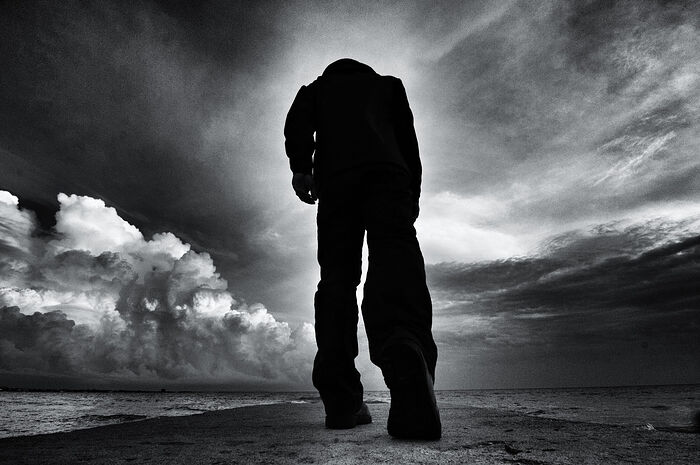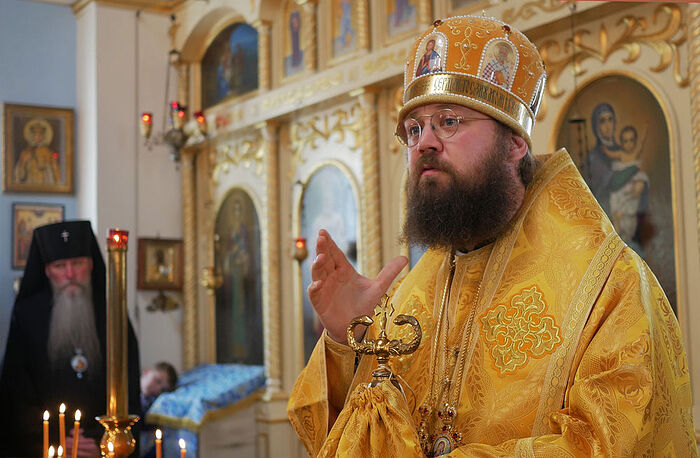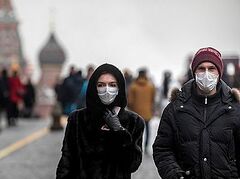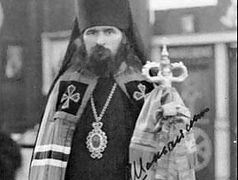In the Name of the Father, the Son and the Holy Spirit. My dear brothers and sisters: we are living now in a moment that demands faith — and not faith in ourselves, or in our civil structures, in governments or in the wisdom of men. We are living in a moment that requires faith in God: the true God, the only God: the Holy Trinity, Father, Son and Holy Spirit.
And this is not chiefly because we are facing a specific peril from a virus or a pandemic. This is not the chief reason that faith is required of us. We do not diminish the seriousness of the situation in which the world finds itself now: the epidemic is a reality, and there are practical measures that all should take to combat its spread and minimise its impact. But we have been through pandemics before, as a race, as a society, as the Church. We are able to understand, through experience, the need for reaction as well as non-reaction; the necessity of seriousness as well as the necessity for calm. And we know, also from experience, that all trials pass, from the lesser to the great; and wherever one may deem that the present circumstances stand on that scale, one thing is certain: they shall pass, the Church shall remain, and God shall carry us forward.
This world has shown, in these past few months, what really governs it — and it is not wisdom or compassion, or science, or truth. It is fear.
No, the epidemic is not the reason that we live now in a moment that demands real faith. The reason for that necessity is fear. This world has shown, in these past few months, what really governs it — and it is not wisdom or compassion, or science, or truth. It is fear. For many years now the world has been cultivating this as its basic principle of operation: with increasing zeal, it functioned by determining what man should be afraid of, and who, and when — and has made into a norm the concept that the driving force in human life is to be the reaction to such fear. And so we have seen the human race grow accustomed to living in fear of everything: of war; of enemies known and imagined; of the economy; of other people; of history; of the past, and above all of the future; of loneliness; of society; of poverty, and of wealth; of ignorance, as well as of knowledge. The list could go on forever. Man has grown accustomed to being afraid — of everything. And society considers it second-nature now to live according to this fear: states and governments announce what we are to be afraid of, alter our modes of life based on frightened responses to that fear; and as soon as one momentary fear ceases to grip us entirely, another is provided to replace it.
It is therefore no surprise whatsoever that in the face of a hitherto unknown sickness, intense fear would be the response. This weakness has so worked its way into the hearts of mankind that it cannot help itself; and behold, we have seen how truly damaging fear becomes. In the face of an illness, we have seen fear turn brother against brother, society against society; we have seen the economies of whole nations destroyed, which means families left without the means to provide for themselves; we have seen fear upset the education of our children and young people; we have seen fear increase the rates of depression, domestic violence and even suicide to unknown heights — and again we must be clear: it is not a virus that has caused these things, it is fear.
And it is grounded, ultimately, in the one fear that a society without God cannot overcome: the fear of death. The virulent fear that eats away at human hearts is fuelled by the secular inability, or outright refusal, to see beyond death. The secular mind cannot see death as anything other than ‘the end’, and thus a thing to flee from as the utmost evil. For this reason, the avoidance of death is seen as the highest aim, the highest good — even if the result of this is a so-called ‘life’ utterly overwhelmed with fear, sorrow and grief. But I tell you this: death will never be avoided by fearfully clinging to fragments of life — not in the face of sin, nor in the face of a disease. Society today is constantly provoked to base its every decision on the dichotomy between life and death. But death is not the the opposite of life: the opposite of life is fear.
Death is not the the opposite of life: the opposite of life is fear.
For this reason I say to you: we are living now in a moment that demands faith in the True God: the Father Who sent His only Son into the world and Who bestows His Spirit upon the faithful. A Christian, who takes his identity from his baptism into the life, death and resurrection of Jesus Christ, cannot shape his life on the fear of death: for our Lord has defeated death — this is the most central pillar of our Life in Christ! We are children of the God Who is Master over life and death, at Whose will death is transformed to life. It is thus that we heard in the Gospel reading today: entering into the city of Nain, Jesus encounters a widow weeping over the body of her dead son, her only child. The response of Christ is peaceful and divinely calm: He says to the woman merely, ‘Do not weep’, and then He turns to the corpse and says, ‘Young man, I say to you, arise’ — and the dead boy sits up and begins to speak (cf. Luke 7.13-15). God, Who is Love, raises up the dead child — for it is love that is the opposite of death, just as much as fear is the opposite of life.
It is interesting, then, that the word that St Luke uses to describe the reaction of the people who witnessed this miracle is in fact ‘fear’ (страх). He writes, as we heard: ‘Then fear came upon them all, and they glorified God, saying, “A great prophet has risen up among us”, and “God has visited His people”’ (Luke 7.16). But here the Evangelist speaks of an entirely different kind of fear than that which we witness in our world today: the people surrounding Jesus are fearful — not with a terror or cowardice or anxiety in the face of the world, but with an awe in the power of God that surpasses their understanding. Their ‘fear’ is in their own lack of faith: that God Himself, the God Who raises the dead and brings life to the world, has been standing in their midst and they were too blind to see it — and now that they see it, that same awe propels them immediately to faith.
My brothers and sisters, this is the spirit that is required of you today. It is not enough simply to bear the name ‘Christian’ as a kind of affiliation or badge: we must live and think and breathe after the manner of Christ our God. We cannot watch Him conquer life, and then ourselves remain afraid of death. We cannot behold His sovereignty of all things, and then remain fearful of the world, or our future. We will not succumb to the temptation too many are following: to let fear even infect an understanding of God, so that the Holy Mysteries that He provides as the medicine of eternity and the gift of everlasting life — life! — are placed under suspicion, as if they might convey disease or death. Anathema! This is a sin, plainly and simply.
The Church’s message is clear and unequivocal, and she does not bow before time, or history, or powers, or temptations.Cling to her and you, too, shall have this stability and strength. We will never change our beliefs or our practices out of fear.
We as a Christian people are in no way against cooperating with governments and authorities in difficult times when their edicts are perhaps an annoyance but do not prevent us from maintaining our beliefs and living our Christian worshipping life in its fulness. But a right faith is a necessity now, and it is obtained through our obedience to the Church which is the living Body of this same Lord. The Church does not cower in fear before the temptations of this world: she is the rock upon which those stand, who will not be tossed about by them. Her teachings are sure and true, because they are God’s. Her practices are right and proper, because the Holy Spirit Himself has forged them and sanctified and blessed them. Her message is clear and unequivocal, and she does not bow before time, or history, or powers, or temptations. And so, my dear faithful, cling to her — and you, too, shall have this stability and strength. We will never change our beliefs or our practices out of fear, rather, we will enter our temples and get on with the business of conforming our lives to God’s, and finding there — and only there — our real salvation.
Amen.






